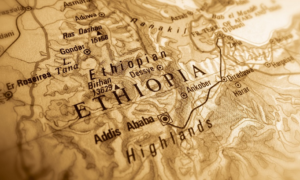Article from BBC News
13 July 2015
The rains have been poor again in this mountainous corner of north-eastern Ethiopia – the site of the 1984 famine in which hundreds of thousands of people starved to death.
But just north of the small market town of Korem, bright green fields and neatly terraced hillsides surround a vast lake, and in the brand new local hospital, the ward reserved for severely malnourished babies is all but empty.
Foreign aid is a notoriously difficult business – and much criticised.
But if you’re looking for results, then this vast climate-change challenged country, led by a hugely ambitious and severely authoritarian government, is worth a visit.
In the first decade of this century, the number of Ethiopians living in poverty dropped by a third.One doctor told me he thought his hospital won’t need aid in 10 years
In the last five years, child mortality has come down by two-thirds.
There’s good reason to expect the trend will continue.
“Two years ago – before the hospital was built – this baby would have died,” said a young doctor, Betgel Mekonnen, as nurses fed an emaciated one year old with fortified milk.
“We are grateful to Britain and the international community for their help, but I think we’ll [become self-sufficient] in five or 10 years,” he said.
It’s a sense of confidence one hears often in a country whose economy has been growing at close to 10% a year for a decade.

Ethiopia’s progress since 1984
227 child deaths per 1,000 in 1984; 64 in 2013
GDP growth in 1984: -2.85% (a fall); 10.5% in 2013
GDP per head in 1984: $205;$568 in 2014
Population in 1984; 39.5 million;96.5 million in 2014
Source: The World Bank
Is Ethiopia’s building boom masking poverty?
Have UK businesses missed the train in Ethiopia?

Growth amid repression
This week a big conference in Ethiopia’s fast-growing capital, Addis Ababa, will discuss ways to finance ambitious new international development goals – with a growing focus on improving local tax collection, and fighting illicit capital flight, across Africa.
For now, British taxpayers are giving over £300m ($466m) a year to help fight poverty in Ethiopia.
“This is a place where you can see your money achieving something,” said Tim Conway, who works in Ethiopia for the UK’s Department for International Development (DfID).
“Development processes always create winners and losers, but the vast majority are sharing in the growth. We’ve learnt not to question [the government’s] ambition too much because they’ve quite often exceeded what we thought was possible,” he said.
But Ethiopia, like tiny nearby Rwanda, poses some difficult questions for democratic countries with good intentions.
Both nations have achieved remarkable economic growth in the context of an often highly repressive form of governance.
Critics accuse donors of quietly ignoring human rights abuses, or even of indirectly sustaining them.
Mr Conway acknowledged there were a lot of “hard arguments” with Ethiopia’s government, and “there are policies we don’t support, and won’t”.
But he praised a bilateral partnership that “is really quite effective”.
The clear hope, on both sides, is that with the right, sustainable, projects Ethiopia can wean itself off foreign aid within the foreseeable future.
Near the small hillside village of Bahari Hatsra just outside Korem, we found 40-year-old Admassie Mekonen walking home with a simple wooden plough on his shoulder, after a day’s work on the small field he rents.
For the past four years he, his wife and 10-year-old daughter have benefited from a partly British-funded programme that pays Mr Admassie a monthly wage of about £20 ($31) during the six-month “food gap” season before harvest, when the family has exhausted its supplies.
In return, he works on a variety of public projects, chosen by the community – terracing the hillsides, for example, to prevent soil erosion.
The programme is a part of a recent shift away from giving foreign aid money to support individual governments, and instead to put it directly in the hands of the poor.
Managing without aid
“It’s hundreds of thousands of man-hours every year… it’s restored the landscape,” said Mr Conway.
But the challenges ahead remain significant.
Ethiopia’s population is heading towards 100 million, with a quarter still living in extreme poverty.
Sitting down in front of his simple wood and mud home, Mr Admassie said the cash payments had, at times, saved his family from starvation. But he questioned whether he would ever be able to manage without them.
“I don’t own any land. I rent my fields. I have to give half the crop to the owner as payment.
“I can work hard now, but I worry about what will happen when I get older. I will have to go to the city to find work,” he said.






